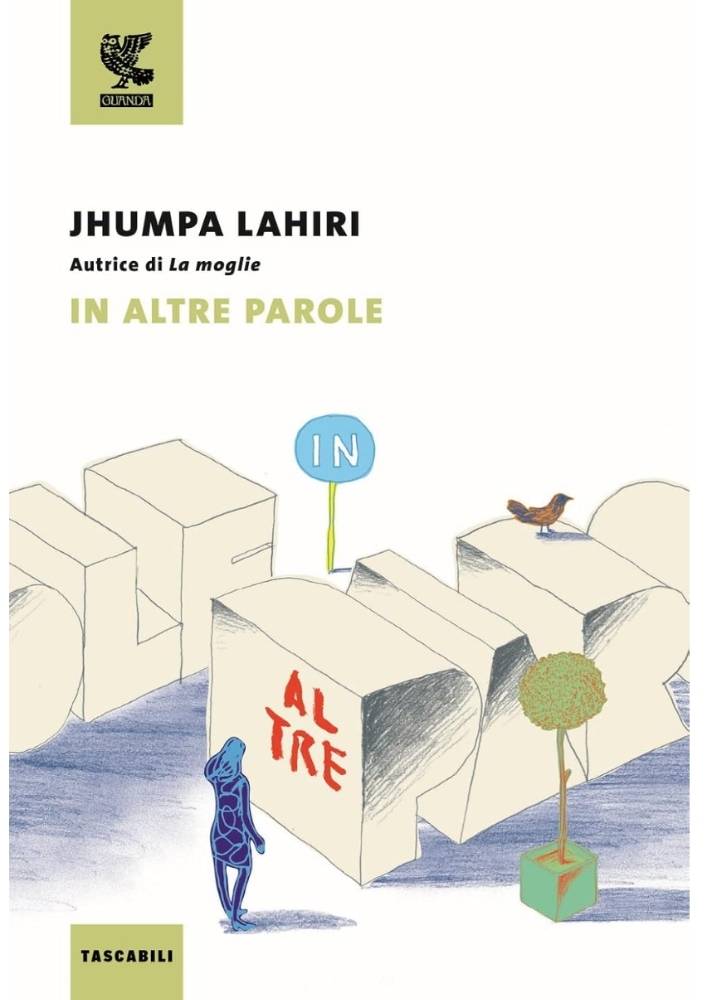The First Book in Italian (and About Italian) by the Pulitzer Prize-Winning Author. An inner journey, more than a geographical one, in search of oneself.
This is the story of a love at first sight, a long courtship, a deep passion: the one of a writer falling in love with the Italian language.
What is the plot of the book In Other Words?
Jhumpa Lahiri is a young graduate when she first visits Florence; as soon as she hears Italian, she is captivated by its sounds and realizes she must learn it. She cannot explain the sudden, urgent need, but she knows she will do anything to fulfill this desire. At first, she tries studying Italian in her city, New York, with a series of private tutors, but it is not enough. Even subsequent brief visits to Mantua, Milan, Venice do not satisfy her: she wants a real, deep, even daily relationship with Italian, immersing herself completely in the reality of the new language. In 2013, she moves to Rome with her entire family. And there begins the real adventure, full of enthusiasm and difficulties, discouragement, and alienation.
In Other Words is the first book written directly in Italian by the author who is of Bengali origins and English mother tongue because of her British and American nationalities. It is the testimony of a tenacious journey of discovery, learning, and linguistic metamorphosis, which started in America and continued directly in Italy. The book has 23 chapters, in each of which the author reflects on her relationship with the Italian language and with the other languages in her life (Bengali and English).
Who is the Indian author who writes in Italian?
Jhumpa Lahiri was born in London to Bengali parents. Raised in the United States, she taught at Princeton and currently teaches at Barnard College, Columbia University. She lives between Rome and New York. She wrote Interpreter of Maladies, which won the Pulitzer Prize for Fiction in 2000; The Namesake, Unaccustomed Earth, The Lowland, In Other Words, Whereabouts, and in 2022, she published the collection of short stories Roman Stories.
In Other Words by Jhumpa Lahiri for learning Italian
This is a book I always recommend to my students who are passionate about Italian, even readable by a less experienced learner of our language. The style is essential and fluid: short sentences, uncomplicated syntax, simple but never trivial language overall. I chose to use this text during my lessons, and I must say it is very well-received, as the students identify with the difficulties of learning a new language. Jhumpa dwells with the identity carried by a language. The novel’s metaphors used to describe the Italian language make the book oneiric and almost psychoanalytical. Furthermore, the brevity of the chapters allows the reader to “catch their breath” for a deep reflection.
Synopsis
In Other Words by Jhumpa Lahiri is a book of surprising beauty that explores themes of learning a foreign language, the search for a place called home, the language one is used to speak, as well as cultural identity, the meaning of exile, belonging, cultural displacement, distance, and alienation.
Title: In altre parole
Author: Jhumpa Lahiri
ISBN: 9788823513457
Publisher: GUANDA
Year of Publication: 2015
For those who do not yet feel ready to “swim” on their own but still feel the need for a “life jacket,” there is an excellent bilingual edition:
Author: Jhumpa Lahiri, transl. by Ann Goldstein
Title: In Other Words – Fiction Italian/English – Bilingual Edition
Published: 2017
Publisher: Bloomsbury
ISBN: 9781408866139

Quotations from In Other Words by Jhumpa Lahiri
In italiano ho la libertà di essere imperfetta
In Italian I have the freedom of being imperfect
IL LAGO
Per vent’anni ho studiato la lingua italiana come se nuotassi lungo i bordi di quel lago. Sempre accanto alla mia lingua dominante, l’inglese: Sempre costeggiandola. È stato un buon esercizio. Benefico per i muscoli, per il cervello, ma non certo emozionante. Studiando una lingua straniera in questo modo, non si può affogare. L’altra lingua è sempre lì per sostenerti, per salvarti. Ma non basta galleggiare senza la possibilità di annegare, di colare a picco. Per conoscere una nuova lingua, per immergersi, si deve lasciare la sponda. Senza salvagente. Senza poter contare sulla terraferma.
THE LAKE
For twenty years I studied Italian as if I were swimming along the edge of that lake. Always next to my dominant language, English. Always hugging that shore. It was good exercise. Beneficial for the muscles, for the brain, but not very exciting. If you study a foreign language that way, you won’t drown. The other language is always there to support you, to save you. But you can’t float without the possibility of drowning, of sinking. To know a new language, to immerse yourself, you have to leave the shore. With no life vest. Without depending on solid ground.
IL PONTE
Sia a Venezia sia sulla pagina, i ponti sono l’unico modo per muovermi in una nuova dimensione, per superare l’inglese, per arrivare altrove. Ogni frase che scrivo in italiano è un piccolo ponte da costruire, poi da attraversare. Lo faccio con titubanza mista a un impulso persistente, inspiegabile. Ogni frase, come ogni ponte, mi porta da un luogo a un altro. è un percorso atipico, seducente. Un nuovo ritmo. Adesso mi sono quasi abituata.
THE BRIDGE
Both in Venice and on the page, bridges are the only way to move into a new dimension, to get past English, to arrive somewhere else. Every sentence I write in Italian is a small bridge that has to be constructed, then crossed. I do it with hesitation mixed with a persistent, inexplicable impulse. Every sentence, like every bridge, carries me from one place to another. It’s an atypical, enticing path. A new rhythm. Now I’m almost used to it.
IL COLPO DI FULMINE
Non avrei un vero bisogno di conoscere questa lingua. Non vivo in Italia, non ho amici italiani. Ho solo il desiderio. Ma alla fine un desiderio non è altro che un bisogno folle. Come in tanti rapporti passionali, la mia infatuazione diventerà una devozione, un’ossessione.
LOVE AT FIRST SIGHT
I don’t have a real need to know this language. I don’t live in Italy, I don’t have Italian friends. I have only the desire. Yet ultimately a desire is nothing but a crazy need. As in many passionate relationships, my infatuation will become a devotion, an obsession.
Well, now all that remains is for me to wish you a good swim in the clear lake of our language!



